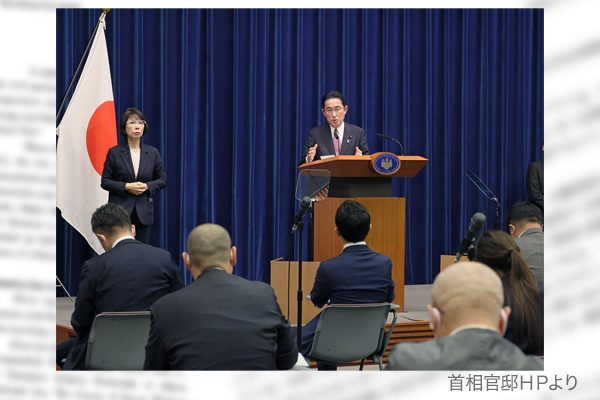No country should be allowed to use nuclear arsenal to intimidate others. The role of national leaders should be to establish defensive posture against such intimidation. Regrettably, however, Japanese Prime Minister Fumio Kishida has shown no guts to do so.
Asked at a press conference on March 3 if he could “protect people’s lives by sticking to the three non-nuclear principles” of not possessing, producing or allowing the entry of nuclear weapons into Japanese territory, Kishida said: “We have protected Japan’s security with our own defense capabilities and the deterrence of the Japan-U.S. alliance. I believe we can protect the people’s lives and livelihood with the current posture.”
I would like to ask Kishida a question. Japan is surrounded by nuclear-armed China and North Korea as well as Russia while Europe is threatened only by Russia. These countries are all autocratic. How will the prime minister respond if they threaten to use nuclear weapons as Russian President Vladimir Putin did recently in connection with the Ukraine situation? Kishida’s remark about his personal belief is not persuasive.
Explain changes of the times to the nation
Given that Japan’s ultimate national security depends on U.S. nuclear weapons’ extended deterrence, the three non-nuclear principles, especially the principle of not allowing nuclear weapons into Japanese territory is logically unreasonable. Unlike the North Atlantic Treaty Organization that has nuclear sharing arrangements to deploy U.S. nuclear weapons in five European allies in order to secure the extended deterrence, Japan has failed to fully verify the effectiveness of the extended deterrence.
Kishida is responsible for explaining to the nation that the time is over when Japan was allowed to be complacent with the U.S. nuclear umbrella while emphasizing itself as the only atom-bombed country and advocating the three non-nuclear principles.
In February 2021, a task force cochaired by former U.S. Defense Secretary Chuck Hagel published a report titled “Preventing Nuclear Proliferation and Reassuring America’s Allies.” It called for bringing allies into the nuclear planning process from the outset, increasing alliance crisis-management exercises and involving alliance leaders at the highest level in regular wargaming if only to reassure U.S. allies about American nuclear guarantee. Specifically, the report proposed to create a consultative group that would provide a platform for Australia, Japan and South Korea to discuss specific policies associated with U.S. nuclear forces. How would Kishida respond if the United States invites Japan to take part in such group?
Japan should develop nuclear shelters
Elected from Hiroshima, Kishida has repeatedly highlighted Japan as the only atom-bombed country in the world. But Japan has made little progress in developing nuclear shelters that protect people from nuclear attacks. When a U.S. atomic bomb hit Hiroshima, pupils survived at an underground school facility only 500 meters from the epicenter. It is Kishida who should take initiative to construct nuclear shelters and other facilities to protect people.
Be prepared and have no regrets. Japanese lawmakers who even refuse to discuss nuclear sharing should learn from Germany that was defeated along with Japan in World War II but has decided to substantially enhance its defense capabilities. Nuclear issues should not be left to some experts. Kishida should galvanize public opinion to revise the three non-nuclear principles and pursue to enhance nuclear deterrence.
Takashi Arimoto is a Planning Committee member at the Japan Institute for National Fundamentals and publisher of Monthly Magazine SEIRON at the Sankei Shimbun newspaper.


